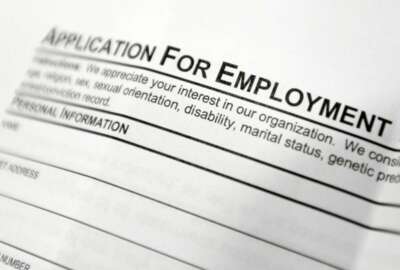Senate passes $1.5T omnibus spending deal seeking state of the federal workforce updates
The $1.5 trillion omnibus spending bill for fiscal 2022 directs agencies to brief lawmakers on a variety of federal workforce issues in the coming months.
UPDATE: The Senate on Thursday night passed the $1.5 trillion omnibus bill that will fund federal government agencies for the remainder of fiscal year 2022.
Congress, nearly halfway through the fiscal year, has passed a $1.5 trillion comprehensive spending deal for the rest of fiscal 2022.
The Senate voted 68-31 Thursday night to pass a $1.5 trillion omnibus bill that will fund federal government agencies for the remainder of fiscal year 2022, following in the footsteps of the House, which passed the measure the previous evening. The bill now goes to President Biden’s desk.
The House, in addition to the omnibus spending bill, also passed a short-term continuing resolution that funds the government through March 15. The current CR expires midnight Friday.
Congress passed several stopgap CRs this fiscal year to avoid a government shutdown, and lawmakers haven’t passed a budget deal on time in many years.
The House and Senate appropriations committees released the FY 2022 spending package Wednesday.
“It is unquestionably in the interest of the American people that the House and the Senate act quickly to pass this bill and send it to the president,” Senate Appropriations Committee Chairman Patrick Leahy (D-Vt.) said in a statement Wednesday.
The bill includes $730 billion in total non-defense funding, a 6.7% increase over enacted levels. It’s the largest increase in non-defense funding in four years.
The bill also provides $782 billion in defense funding, a 5.6% increase from enacted levels.
House Appropriations Committee Chairwoman Rosa DeLauro (D-Conn.) said the spending deal “delivers transformative federal investments.”
The omnibus directs agencies to brief lawmakers on a variety of federal workforce issues in the coming months.
The omnibus spending package directs the Office of Management and Budget and the Office of Personnel Management to brief the appropriations committees, no later than 90 days after the bill passes, on the challenges agencies face hiring qualified federal employees in a reasonable amount of time.
“There is concern about the length of time it takes the federal government to hire qualified employees and difficulty talented individuals have in applying for and securing federal employment,” lawmakers wrote in an explanatory statement for the financial services and general government portion of the bill. “Many, if not all, of the agencies funded in this bill have raised concerns about the hiring process. Often, when agencies are finally able to offer employment to a qualified individual, it is too late, and the candidate has accepted other employment. Attracting the best talent to serve in the federal government is essential.”
It also directs OPM to include “telework successes, best practices, and lessons learned during the COVID-19 pandemic,” as part of its annual telework report.
OPM is also required under the omnibus to include post-pandemic remote work guidance and recommendations in its telework report.
The omnibus also requires OPM to develop a governmentwide human capital strategy focused on the current state of the federal STEM workforce, as well as anticipated STEM talent needs.
Lawmakers expect OPM to complete the report within a year, and should include existing hiring authorities, recruitment and hiring practices and the “feasibility of streamlining of restructuring those authorities and pathways to improve recruitment and hiring of STEM talent.”
The omnibus also directs OPM to increase the number of interns that work in the federal government over a three-year period.
During this period, Congress expects OPM to work with agencies and organizations experienced at internship recruitment and professional development.
The House and Senate appropriations committee request OPM brief them, no later than 180 days after the bill passes, on recruitment practices, onboarding, professional development and how agencies could expand or modify existing hiring authorities to hire more interns.
“It is expected that agencies will utilize existing hiring authorities for interns, including authorities that would allow for interns to convert to the permanent federal workforce upon completion of the program’s requirements,” lawmakers wrote.
The omnibus requires the General Services Administration to provide the committees with an update on the “future of federal office space,” no later than 180 days after the bill passes.
Lawmakers are specifically looking for GSA to provide an update on how agencies can reduce their office space requirements “based on lessons learned from the use of telework during the pandemic.”
Lawmakers also direct GSA to brief the committees on the viability of building a new FBI headquarters at one of three sites in suburban Maryland or Virginia.
The bill gives the Department of Homeland Security more than $209 million to continue construction on a consolidated DHS campus at St. Elizabeths West.
IRS gets its largest budget increase in decades
The spending deal gives the IRS its largest spending increase in decades, as well as a long-sought-after direct hiring authority, which will allow the agency to bring employees onboard more quickly to deal with its current backlog of tax returns and correspondence.
The bill gives $12.6 billion to the IRS — that’s a 5.6% increase from enacted levels, and is the largest budget increase the agency has received since 2001.
The bill also gives the IRS special transfer authority, which allows the IRS to transfer funds from its enforcement and operations support divisions to address a backlog of tax returns and correspondence.
The bill also gives the IRS direct-hire authority to address the backlog of returns and correspondence.
The omnibus bill specifically directs the Treasury Secretary Janet Yellen or a delegated official “to recruit and appoint qualified applicants, without regard to any notice or preference requirements, directly to positions in the competitive service to process backlogged tax returns and return information.”
The omnibus directs the IRS to brief the appropriations committees within 30 days of the bill passing on the status of its tax return and correspondence backlog.
“Millions of taxpayers have been inconvenienced by the historical filing return and correspondence backlog and struggle to reach an IRS customer service representative,” lawmakers wrote.
The omnibus would also require the IRS to brief the committees, within 60 days of the bill passing, on the state of the “tax gap” between what taxpayers owe and what the IRS collects each year, as well as brief lawmakers on how it sets its audit policies.
The bill gives the IRS $275 million for business systems modernization, which will help the agency modernize its legacy IT systems and improve IRS web applications — a $52 million increase above enacted levels.
The funding will specifically go toward modernizing its Customer Account Data Engine 2 (CADE-2), which would give the IRS near real-time information on a taxpayer’s account when they call the agency seeking assistance.
The funding would also help the IRS modernize its Enterprise Case Management System, web applications and taxpayer assistance systems, as well as strengthen cybersecurity and data protection.
The omnibus directs the Treasury Department to conduct a semi-annual review of the IRS’ major IT investments, and directs the Government Accountability Office to review and provide an annual report on the state of the IRS’s major IT investments.
The spending package, however, doesn’t grant the IRS multi-year funding for IT modernization. IRS Commission Chuck Rettig has repeatedly asked lawmakers for multi-year funding to avoid a “start-and-stop approach to IT modernization.”
National Treasury Employees Union president Tony Reardon said the union strongly supports the proposed funding increases for the IRS and said the funding would begin the process of “helping the agency rebuild after 10 years of severe budget and staffing cuts.”
“NTEU believes that the increases to the IRS budget, as contained in this legislation, will help the agency and its workforce better serve taxpayers — individuals and businesses — who want to comply with their tax obligations and catch those who try to avoid them, both of which are essential to a tax system that is fair to everyone,” Reardon said.
Every dollar spent on IRS operations generates about $6 in revenue for the federal government.
Supplemental COVID-19 spending out of bill, but Ukraine funding remains
The spending deal, at first, included $15.6 billion for COVID-19 programs, nearly $7 billion short of what the Office of Management and Budget requested from Congress last week.
However, House Speaker Nancy Pelosi (D-Calif.) announced Wednesday afternoon that lawmakers would pull supplemental COVID spending out of the omnibus.
Pelosi told members in a letter that Republicans demanded the omnibus offset spending on COVID-19 programs through cuts elsewhere, while Democrats pushed back on plans to fund the COVID-19 response by cutting state and local aid in the spending deal.
“We must proceed with the omnibus today, which includes emergency funding for Ukraine and urgent funding to meet the needs of America’s families,” Pelosi said. “It is heartbreaking to remove the COVID funding, and we must continue to fight for urgently needed COVID assistance, but unfortunately that will not be included in this bill.”
The omnibus, however, still provides $13.6 billion in emergency assistance to Ukraine and NATO allies, exceeding the White House’s request for $10 billion last week.
The administration launched a National COVID-19 Preparedness Plan last week asked Congress for $22.5 billion in supplemental funding for fiscal 2022 to support a new wave of COVID-19 programs, and expects to eventually ask lawmakers for additional funding on top of that amount.
Acting OMB Director Shalanda Young said in a statement that she urged Congress to approve the spending bill and send it to President Joe Biden for his signature “without delay.”
Copyright © 2024 Federal News Network. All rights reserved. This website is not intended for users located within the European Economic Area.
Jory Heckman is a reporter at Federal News Network covering U.S. Postal Service, IRS, big data and technology issues.
Follow @jheckmanWFED






